- Home
- Lin Carter
Horror Wears Blue
Horror Wears Blue Read online
Table of Contents
Dedication
Note
CHAPTER 1 — Three Men in Blue
CHAPTER 2 — Omega Intervenes
CHAPTER 3 — Zarkon’s Challenge
CHAPTER 4 — Enter the Vulture
CHAPTER 5 — A Few Surprises
CHAPTER 6 — Yellow Death
CHAPTER 7 — At the Cobalt Club
CHAPTER 8 — Nine Strange Men
CHAPTER 9 — Spies in the Sky
CHAPTER 10 — Tricked!
CHAPTER 11 — The Secret of the Map
CHAPTER 12 — More Mysteries
CHAPTER 13 — The Abduction of “Aloysius”
CHAPTER 14 — To the Rescue
CHAPTER 15 — The House in Hammersmith
CHAPTER 16 — The Disappearing Trick
CHAPTER 17 — Underwater!
CHAPTER 18 — The Vulture’s Roost
CHAPTER 19 — The Ruse
CHAPTER 20 — The “Guests” Check Out
CHAPTER 21 — The Vulture Is Snared
CHAPTER 22 — The Raid
CHAPTER 23 — The Coop Is Flown
CHAPTER 24 — The Getaway
CHAPTER 25 — On the Run
CHAPTER 26 — In at the Kill
CHAPTER 27 — The Secret of the Blue Men
CHAPTER 28 — “Fooey” Is Foiled Again
This is a work of fiction. All of the characters, organizations, and events portrayed in this novel are either products of the author’s imagination or are used fictitiously.
HORROR WEARS BLUE
Copyright © 1987 by Lin Carter.
Published by agreement with Wildside Press LLC and John Gregory Betancourt.
All rights reserved.
Edited by Dan Thompson
A Thunderchild eBook
Published by Thunderchild Publishing. Find us at https://ourworlds.net/thunderchild_cms/
First Edition: 1987
First Thunderchild eBook Edition: December 2017
Dedication
For Edmond Hamilton,
the creator of Captain Future.
Note
This is the fifth case taken from the files of the top secret, crime-fighting organization known as Omega that I have written in the form of a narrative.
As in those books that went before, I have changed most of the names of people and places. (There is, for example, no major city on the eastern seaboard named Knickerbocker City, and no individual known to me who is called “Prince Zarkon.”)
As in my previous novelizations of cases from the Omega files, I have taken the liberty to fill in such names with those fictitious ones drawn from crime novels and back issues of the more famous superhero pulps of the Glorious Thirties, such as Doc Savage and The Shadow.
This is done playfully. I doubt if my readers will be unfamiliar with such names. Surely, every reader of Sax Rohmer’s delicious Fu Manchu books and stories will know such names as Sir Dennis Nayland Smith, Doctor Petrie, and Karamaneh, although Val Petrie, the son of the latter two, will be a new name for most of my readers.
Although the knighthood very recently conferred on George Gideon will also be new information to my readers, I trust that the fans of the fine novels of the late John Creasy will be able to identify the character. I will not spoil your fun with further identification, leaving you to play your end of the “Zarkon game,” except to note briefly:
The imaginary British country towns of Fenchurch St. Paul and St. Mary Mead are drawn respectively from the works of Miss Dorothy Sayers and from the famous “Miss Marple” stories of Dame Agatha Christie. They and their locations are described accurately.
But I must keep this introductory note as brief as possible. After all, we have an exciting story ahead of us, and —
The game’s afoot!
LIN CARTER
New York, New York
CHAPTER 1 — Three Men in Blue
Night hung over the city of London, cold and dank. A thick wall of fog had come rolling in across the Thames, to curl its clammy tendrils through the streets and alleys of Soho. Seagulls honked sorrowfully, veering through the chilly air and boat horns groaned eerily across the dark waters, while ship bells clanged as somberly as if they signaled the burial of the dead.
P.C. Willis T. Higgins shivered as a raw gust of wet air knifed through his overcoat, and drew his woolen muffler up closer about his throat.
Actually, the beefy, flat-footed man with the red bulldog face was no longer a constable in the Metropolitan Police, having retired after thirty years of faithful service only seven months before. But although he was no longer entitled to add the dignity of those initials, “P.C.,” before his name, he had enjoyed the privilege for so many years that he thought of himself in that style and manner, not merely as “Mr.” Higgins.
He also heartily missed the old routine, the loyal comrades, the discipline and excitement of his years of pounding the pavements. So much so, in fact, that he had applied for his present job as night watchman for the Consolidated Shipping Company, Ltd., as much from a nostalgia for those unforgotten years as for the useful addition his paycheck made to his retirement funds.
On such nights as these, Higgins spent most of his watch seated comfortably in the little shipping office, feet propped up on the hissing radiator, browsing through a thriller, or watching the telly. But once every hour, he donned his coat and muffler, took up the small revolver he was not supposed to carry but did, and faithfully made his rounds of the company property.
He had walked this route hundreds of times before, and never once had there been anything out of the normal to engage his attention.
Once, to be honest, there had been the startling clatter of an ash can being hastily overturned, but when Higgins had directed the beam of his torch upon the culprit, he discovered nothing more than a scrawny alley cat scuttling for safety.
On another, somewhat more exciting, occasion, two common working-class men, soused on ale, had been discovered sleeping under a truck. Higgins still remembered the glow it had given him, to summon the bobbies to cart these hapless malefactors away.
Tonight, however, held excitement of an entirely different sort in stow for P.C. Willis T. Higgins ...
As he approached the steel chain link fence which surrounded Warehouse #4 on his rounds, he spied the beginnings of a mystery which was, before long, to consume the excited attention of half the civilized world.
The tall gate hung idly open. The padlock had been neatly cut through with powerful pincers.
“Hello!” murmured Higgins to himself in a puzzled tone. “And what ’ave we ’ere?”
Snapping off his electric torch and drawing his revolver, the night watchman entered the yard and began looking about warily.
He did not have to go very far, before he stumbled upon mischief.
A truck, painted some dark, nondescript color, was drawn up to the loading platform at one side of the warehouse. There, three men were busily occupied in systematically looting the building. From the shadows, Higgins watched them incredulously.
They had posted no guard, and seemed unconcerned about the dangers of discovery. Nor did they seem to be in any particular hurry with what they were doing. It was as if they had all the time in the world.
The three looters were dressed in business suits of an odd shade of blue. They were bareheaded and wore no gloves. They did not appear to mind revealing their faces, for they had made not the slightest attempt to mask or conceal their features.
P.C. Higgins could hardly believe his eyes. Such a bold and brazen robbery was something beyond all of his experience. What he should have done was to return to the office and telephone the police. But he was too incensed for that. He thrust out his bulldo
g chin belligerently, his heavy face turning beet red with wrath.
Brandishing his revolver threateningly, he stepped full in the path of one of the men in blue. The crook was carrying a case of delicate electronic components out of the warehouse, and was ready to load it into the waiting truck. He stopped short, however, as Higgins materialized out of the shadows.
“ ’Ere, you,” growled the night watchman. “Put that case down and getcher ’ands up. Lively, now!”
The man in blue gave him a casual, noncommittal look, but seemed unalarmed. He did not even bother glancing at the stubby revolver Higgins clenched in one fist.
“I’m givin’ yer fair warning, now!” said the watchman. He leveled the pistol at the other man, who simply stood there watching him, but without any response. Indeed, he seemed to be smiling faintly, as if scornfully; but, as his face was in shadow, Higgins could not be sure.
The two other men in blue appeared on the platform, each carrying a packing case. They made no comment as they took in the tense scene being enacted before them.
Higgins waved his gun to include the two men on the loading platform. Like the first man in blue, they regarded him incuriously and ignored his weapon. Now the first man stepped around the night watchman and placed the case he had been holding in the rear of the van.
Higgins repeated his warning in a truculent tone. It was ignored.
He fired a warning shot in the air. The man turned from the truck and started to walk back into the warehouse. Higgins sprang in front of him, leveling the revolver.
The man stopped and stood regarding him. As he did so, his face was in the light from the open door and, for the first time, Higgins saw him clearly.
Higgins gasped. He stared, eyes goggling fearfully. His mouth fell open. The sight he was looking at was horrible almost beyond belief. It was like something from another world.
He fired the gun point-blank at the man in blue.
The roar of the gunfire was followed by a sharp pinggg, like a ricochet. But there was no other reaction from the man who had been shot; he simply stood there, looking at the night watchman with a faint smile on his weird face.
Higgins felt as though he were losing his mind. In his experience, when a man is shot full in the chest, he generally falls down. This is true even if he happens to be wearing a bulletproof vest, or the sort of plastic body armor sometimes used by infantry soldiers. The impact of being hit by a bullet is like that of a hammerblow.
This man did not fall down. Nor did he seem in any way discommoded by being shot at close range by a powerful revolver.
The hackles were rising on the back of Higgins’ thick neck. Under his breath, he shakily muttered the names of several saints. Then he raised the revolver and fired a second shot. This time he shot the man full in the throat, in the soft flesh of the throat, where no bulletproof vest or body armor could be worn.
Again, the crack of gunfire, followed by the sizzling whine of a ricochet.
No wound appeared in the man’s neck. No blood spurted. He did not even stagger back under the hammerlike impact of the bullet.
It had rebounded from his flesh as if it had struck the steel side of a battleship.
Higgins whimpered something deep in his throat, and hurled the useless revolver at his invulnerable adversary. It caught the man in the face and rebounded, clattering to the concrete. The man’s smiling face was unbruised. He obviously felt not the slightest pain or discomfort.
Higgins wilted. He trembled from top to toe. He tried to scream, but his mouth was as dry as paper and no sound emerged, save for a hoarse whisper.
He turned on his heel and fled from these uncanny men who did not bleed or fall down when you shot them.
Staggering into the office, he clawed the phone from its cradle and summoned help. Then he fainted dead away.
When the police arrived, the van was long gone. So were the packing cases filled with delicate electronic components worth many thousands of pounds, and the three men in blue.
Higgins was roused from his swoon. Incoherently, he babbled the story of what he had seen. The police listened without comment. Then they called an ambulance and had the night watchman carried off to the London equivalent of Bellevue for mental observation and sobriety tests.
The next morning, around the world, newspapers were filled with huge black headlines.
The headline on the front page of the Knickerbocker City Daily Sentinel read:
“BULLETPROOF” MEN ROB LONDON WAREHOUSE
While headlines on the less reputable tabloids were much less restrained. One of the headline writers for the cheaper papers coined a doozy:
HORROR WEARS BLUE!
CHAPTER 2 — Omega Intervenes
While these things were happening to P.C. Willis T. Higgins, formerly with the London Metropolitan Police, dawn broke over the Henry Hudson River on the other side of the world. That great metropolis, Knickerbocker City, began awakening.
In Omega headquarters on the Upper West Side, it was the Hindu servant, Chandra Lal, who usually awoke first. The proud Rajput warrior got up early in order to begin making breakfast for his master, Prince Zarkon, and the five Omega men, his associates.
Then it was Doc Jenkins who got up, grumbling and yawning, stumbling into the kitchen to gulp down black coffee heavily laced with sugar. Jenkins, a huge, slab-sided man with gangling limbs and outsized hands and feet, possessed the dull-eyed, heavy jawed face of a mentally retarded person. Actually, he had one of the most amazing brains on the planet; it was not for nothing that he had been called “the man with the camera eyes.” He also possessed an ear like a tape recorder, and a mind like a computer. Anything Doc Jenkins had ever seen, read, or heard, was indelibly impressed upon his astonishing memory, ready for instant recall in 100 percent accuracy.
It was Doc’s job to quickly scan the dozens of newspapers brought daily to Omega from all over the country and several foreign capitals. So swiftly could Doc Jenkins’ camera eyes scan the tight columns of newsprint, that he could read every word of a paper from the front page to the last, in less time than it would take you or me to merely skim the editorials.
In one huge paw the size of a catcher’s mitt, Doc clenched a red marking pen. With this he boxed any news item that was at all out of the ordinary: anything strange, weird, uncanny, queer, or quirky.
This was done on the instructions of his chief, Zarkon, who knew that very often an odd little news item tucked away in the back pages actually signals the first act of one of those unearthly mysteries Omega existed to solve.
That particular morning, as you can imagine, Doc Jenkins had plenty to box in red. For the newspapers were filled with stuff about the curious adventure of the bulletproof men in blue — or the “Blue Men,” as they were shortly to be known.
While his five aides usually breakfasted together in the dining room off the compact but amazingly efficient little kitchen, it was Zarkon’s practice to breakfast alone in his room. While downing the superb scrambled eggs, buttered biscuits, crisp bacon, black coffee, and freshly squeezed orange juice Chandra Lal had prepared for him, Zarkon quickly skimmed the morning newspapers, paying particular attention to the items boxed in red.
This morning, as he perused the dailies, a slight frown grew between his brows. This was, in itself, unusual, for Zarkon’s tanned, handsome face generally was expressionless. Displays of emotion were alien to his nature; his feelings were kept private and reticent.
Today, of course, the news was quite unusual, perhaps warranting that unseemly frown of curiosity.
Laying down the papers, Zarkon picked up the phone which stood near to hand. Ace Harrigan, the crack test pilot and former air ace, answered.
“Yes, Chief?”
“Good morning, Ace. Please put through a call to London. I want to speak to Assistant Commissioner Sir George Gideon at New Scotland Yard. Use the SRT, please.”
“Sure, Chief! Something’s up?”
“It would appear so,” said Zark
on tonelessly.
For such calls, the Omega men did not go through the ordinary telephone cables, which can be tapped — even the Trans-Atlantic Cable. “SRT” stood for “Satellite Radio-telephone Transmission.” Omega was the only private agency in the world that had instant access to the communications satellites. Even huge corporations and international conglomerates have to book time in advance, or stand in line, to use this instantaneous method of telephonic communication.
A few seconds later, Zarkon had Assistant Commissioner Gideon on the line.
“Good morning, Your Highness,” said the other.
“Good morning, Sir George,” Zarkon said. And at the other end of the line, Gideon winced involuntarily. His knighthood was so very recent that he was still not accustomed to being so addressed, and it embarrassed him. Doubtless, this would wear off in time, but at the present he chafed under the unexpected weight of the accolade. In fact, due to his lifelong career of crusading against crime, more than a few of the senior officers of the Yard had begun calling him “Saint George,” rather than “Sir George.”
This was not to his face, of course, but behind his back. However, a man like George Gideon not only develops eyes in the back of his head, but ears, as well, and he was aware of the new nickname.
“I can imagine that you are rather busy, at the moment,” Zarkon was saying, “that is, if the morning newspapers did not overly exaggerate last night’s mystery.”
“If anything, sir, they understated,” said Gideon in brusque tones. “What can I do for Your Highness?”
“I am interested in the account of the bulletproof men,” said Zarkon. “How reliable is this witness, Higgins?”
“Thoroughly: he was on the police force for thirty years, with never a mark against his record,” said Gideon.

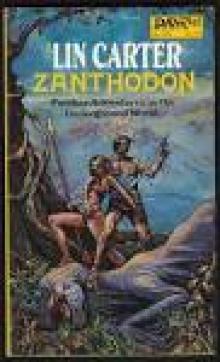 Zanthodon
Zanthodon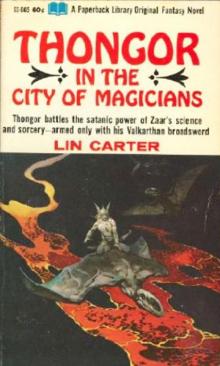 Thongor in the City of Magicians
Thongor in the City of Magicians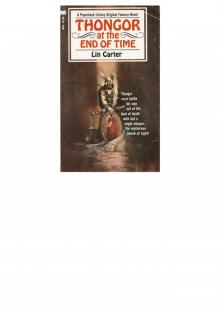 Thongor at the End of Time
Thongor at the End of Time The Valley Where Time Stood Still
The Valley Where Time Stood Still Journey To The Underground World
Journey To The Underground World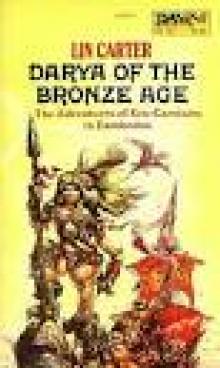 Darya of The Bronze Age
Darya of The Bronze Age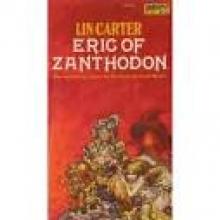 Eric of Zanthodon
Eric of Zanthodon Hurok Of The Stone Age
Hurok Of The Stone Age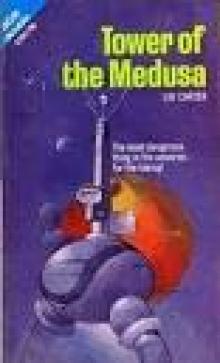 Tower Of The Medusa
Tower Of The Medusa Thongor Fights the Pirates of Tarakus
Thongor Fights the Pirates of Tarakus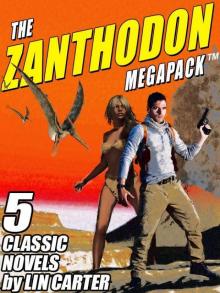 The Zanthodon MEGAPACK ™: The Complete 5-Book Series
The Zanthodon MEGAPACK ™: The Complete 5-Book Series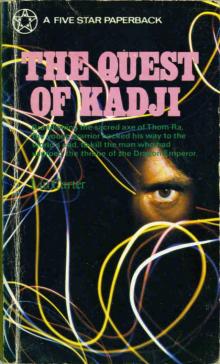 The Quest of Kadji
The Quest of Kadji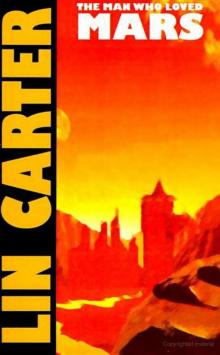 Lin Carter - The Man Who Loved Mars
Lin Carter - The Man Who Loved Mars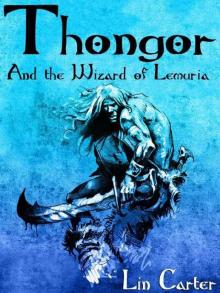 Thongor and the Wizard of Lemuria
Thongor and the Wizard of Lemuria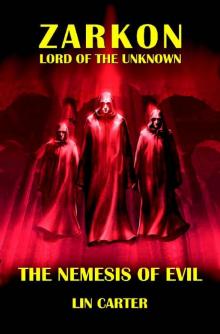 The Nemesis of Evil
The Nemesis of Evil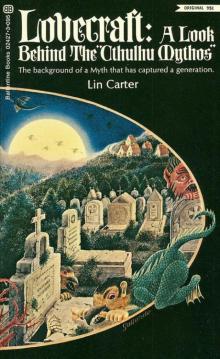 H.P.Lovecraft: A Look Behind Cthulhu Mythos
H.P.Lovecraft: A Look Behind Cthulhu Mythos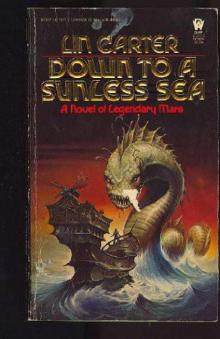 Lin Carter - Down to a Sunless Sea
Lin Carter - Down to a Sunless Sea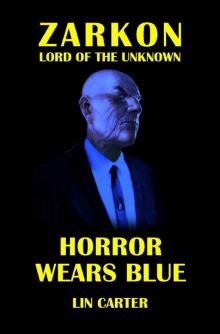 Horror Wears Blue
Horror Wears Blue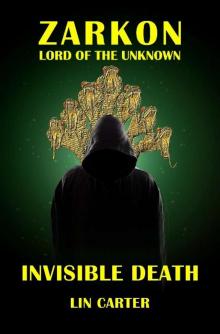 Invisible Death
Invisible Death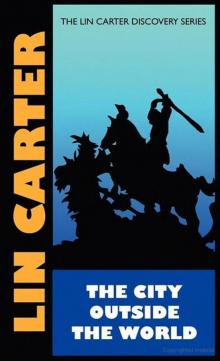 Lin Carter - The City Outside the World
Lin Carter - The City Outside the World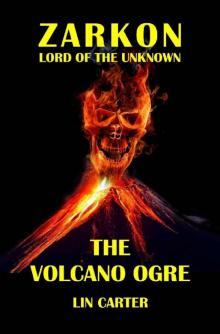 The Volcano Ogre
The Volcano Ogre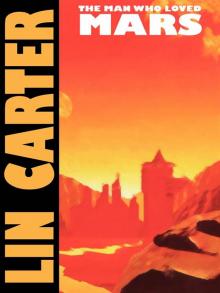 The Man Who Loved Mars
The Man Who Loved Mars